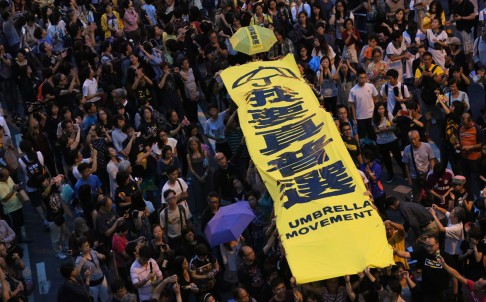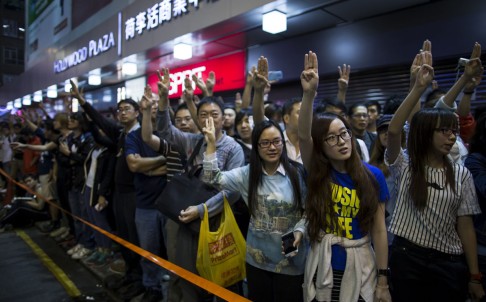Occupy Central
Occupy Central is a civil disobedience movement which began in Hong Kong on September 28, 2014. It calls on thousands of protesters to block roads and paralyse Hong Kong's financial district if the Beijing and Hong Kong governments do not agree to implement universal suffrage for the chief executive election in 2017 and the Legislative Council elections in 2020 according to "international standards." The movement was initiated by Benny Tai Yiu-ting (戴耀廷), an associate professor of law at the University of Hong Kong, in January 2013.
OCCUPY CENTRAL - DAY 63: Full coverage of the day’s events
Tramways loses HK$7.8 million revenue after being stopped in its tracks

Hong Kong Tramways has urged pro-democracy demonstrators to release its occupied track in Causeway Bay, saying it had lost 3.9 million passengers and HK$7.8 million in revenue during the Occupy Central movement.
Carrie Lam Cheng Yuet-ngor silent amid pleas for Occupy concessions

Hopes of concessions to break the stalemate of Occupy Central - which blew up again last night - have been dealt a setback with Carrie Lam Cheng Yuet-ngor not responding to pleas at a meeting with pan-democrats.
Students and pan-democrats must offer effective solutions
PUBLISHED : Saturday, 29 November, 2014, 4:43am
Protesters hold lights and banner saying "I want universal suffrage" in Admiralty. Photo: Felix Wong
I refer to the article by Stephen Vines ("The real radicals want core Hong Kong values cast aside", November 22).
He said that when talking to the Occupy Central protesters, especially the students, he kept hearing, "We don't want Hong Kong to become just another Chinese city." Vines said the protesters wanted to preserve the characteristics that made Hong Kong unique among Chinese cities, which is the rule of law and freedom.
He then said there were people in Hong Kong who "shout very loudly about the need for adherence to the 'one country, two systems' principle but, in practice, focus only on the 'one country' part of this equation". He said these people wanted the city to become a place where the major decisions were made by the central government, and where core values that distinguish Hong Kong from the mainland system were "cast aside". Such people supported "Beijing's ruling on the future of constitutional reform, even though the Basic Law prominently asserts the 'high degree of autonomy' vested in the government of Hong Kong".
Vines gives the impression that people who support Beijing's ruling on constitutional reform are against freedom and the rule of law in Hong Kong. This is an unfair accusation levelled at those of us who support the Basic Law, which clearly states that chief executive candidates must be nominated by a nomination committee.
The Occupy protesters say the nomination committee will block candidates because of their political leanings. The composition of the nomination committee has not even been decided. Instead of endlessly blocking streets, wouldn't the protesters achieve more by coming up with ideas outlining how the nomination committee members can be elected in the most democratic way?
Even if the committee is formed along the lines of the 2012 election committee, we have to remember that this did not stop Albert Ho Chun-yan from becoming a candidate back then.
The central government has said many times that chief executive candidates must "love Hong Kong and love China". It also said that not all pan-democratic politicians fail this test of patriotism.
Is it not more constructive that the pan-democrats and the students identify such a potential chief executive candidate among themselves and put their efforts into getting this candidate nominated by the nomination committee, rather than engaging in disruptive protests that will get them nowhere?
Alex Woo, Tsim Sha Tsui
This article appeared in the South China Morning Post print edition as Pan-democrats and students must offer effective solutions
Occupiers must retreat and devise a new strategy to continue momentum
PUBLISHED : Saturday, 29 November, 2014, 4:43am
Pro-democracy protesters imitate a three-finger salute from the movie "The Hunger Games", at Mong Kok shopping district. Photo: Reuters
Mong Kok has, thankfully, returned to normal at last. Order has been restored after several days of clashes between defiant protesters and police officers during a series of clearance operations along Nathan Road and Argyle Street. True, there were some disturbing scenes and finger-pointing. But the operation was by and large successful. The community is relieved to see the occupied areas finally reopened after two months.
The Occupy movement is far from over, though. Thousands of officers are being deployed to guard against possible reoccupation in the area. Many people are still camped out in Admiralty and Causeway Bay without any sign of retreat.
Crammed with dodgy entertainment and business outlets, Mong Kok has been regarded as a high-risk area. There was always a fear that it would be a flash point for violence, as proved by occasional confrontations between rival camps in the early weeks. That the court-ordered clearance of barricades turned into nasty clashes this week is regrettable. As tensions rose, so did tempers and emotions. It is good to see that the violence was quickly followed by law and order.
As shown in TV news footage, some protesters were cooperative and retreated soon after the clearance operation began. But there was also resistance at some stages, resulting in one of the biggest arrest operations in recent years. As in previous stand-offs, there were accusations that the police acted out of line. Journalists at the scene also complained of mistreatment. Officials said the court injunction did not restrict the police from exercising lawful enforcement powers. They also denied using excessive force in the operation.
Subject to the outcome of another court order being sought, Admiralty will be the next target. Earlier, a smaller clearance in the district went ahead without much drama. Unlike the provocation sparked by the use of tear gas to disperse crowds in Admiralty two months ago, the Mong Kok operation was completed without much outcry. The swing in public opinion lately is the clearest sign yet that the community is in favour of a swift end to the stalemate.
The occupiers have made their position abundantly clear over the past 60 days. Instead of bracing for possible violence in future clearances, they would be better off retreating voluntarily and devising a clear strategy that would allow the pro-democracy momentum to carry on in the long run.
This article appeared in the South China Morning Post print edition as Occupiers need a new strategy


沒有留言:
張貼留言